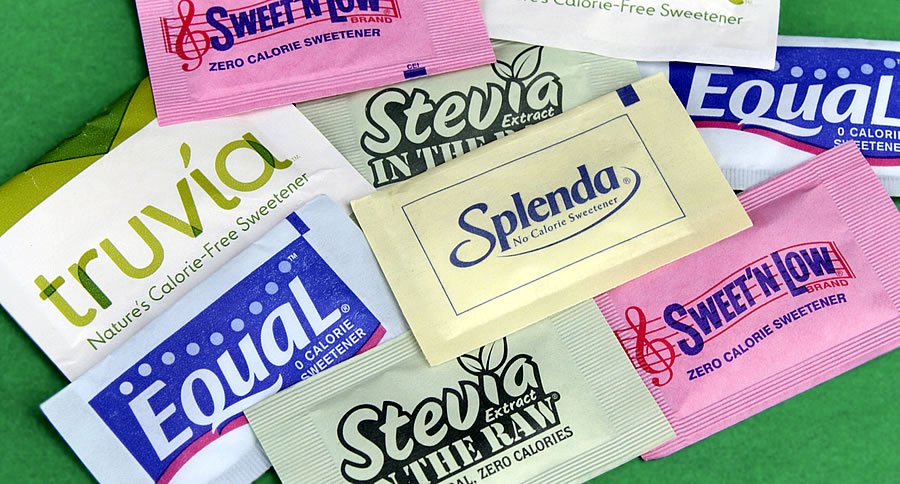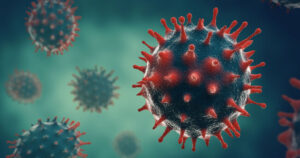WHAT ARE SOME COMMON ARTIFICIAL SWEETENERS?
Common artificial sweeteners include:
- Aspartame
- Acesulfame-K
- Saccharin
- Sucralose
- Neotame
- Trehalose
WHERE CAN YOU FIND ARTIFICIAL SWEETENERS?
Artificial sweeteners can be found everywhere. For example:
- Protein powders
- Diet drinks, such as diet soda
- “Reduced sugar” products
- Yogurt
- Condiments, such as ketchup
- Baked goods, including whole wheat bread, muffins, etc.
- Granola and other cereals
CAN ARTIFICIAL SWEETENERS HELP US LOSE WEIGHT?
Artificial sweeteners are often used in “diet” food products, such as “zero calorie” sodas since artificial sweeteners contain very few calories. However, a Canadian study of 400,000 people over 10 years found that people who used artificial sweeteners tended to gain weight, not lose it. This could be due to various factors.
There is a concern that people who eat more diet foods can trick themselves and replace the calories saved in other ways. For example, people who drink low-fat milk might feel that since it’s low-fat, they can drink more. Or, people might think that because they saved calories by drinking diet soda, then it’s okay to eat a cookie. In this way, they overcompensate and actually eat more calories, leading to weight gain.
Some research suggests that artificial sweeteners can actually change the way our minds perceive the taste of food. Artificial sweeteners are hundreds of times sweeter than actual sugar. Only a tiny amount of artificial sweetener is needed to create an intensely sweet taste. Humans naturally crave sweet foods. Our taste buds change, and we get used to new flavors as our diet changes. Experts from Harvard warn that constant over-stimulation of the sugar receptors can lead to people craving more and more sweet foods, and shunning other foods, that although sweet, are not as intensely sweet as artificial sweeteners, such as fruits. Food that aren’t sweet at all, like vegetables, are then considered disgusting. This can lead to people eating more and more foods with artificial sweeteners, and less foods that are nutritious and wholesome.
As we continue craving foods that are sweet over foods that are nutritious, we gain weight. Researchers found that those in the San Antonio Heart Study who drank more than 21 diet drinks per week were twice as likely to become overweight or obese as people who didn’t drink diet drinks at all.
CAN ARTIFICIAL SWEETENERS HELP WITH DIABETES?
- Researchers found that artificial sweeteners can raise blood sugar levels after consumption.
- People who consume artificial sweeteners may have problems controlling their blood sugar levels.
- Researchers found in animal models that artificial sweeteners change gut bacteria.
Many people with diabetes will use artificial sweeteners to help manage their disease. However, there is some evidence that shows artificial sweeteners can actually be detrimental for controlling blood sugar levels. A study published in the American Diabetes Association’s journal, Diabetes Care, showed that sucralose actually increased levels of insulin and sugar in the blood. Those who took in more sucralose actually had more insulin resistance.
A different study with 6,800 people found a positive association between diet drinks and metabolic syndrome. Metabolic syndrome is a cluster of conditions, such as high blood pressure, high blood sugar, abnormal cholesterol levels, and increased body fat around the waist, which increases the risk of heart disease, diabetes, and stroke. This study concluded that those who drank diet soda every day had a 76% higher risk of developing type 2 diabetes than those who did not.
Research published in the journal Nature showed that artificial sweeteners can induce glucose intolerance in their animal models by changing their gut bacteria.
WHAT ARE SOME SIDE EFFECTS OF ARTIFICIAL SWEETENERS?
| Artificial Sweetener | Side Effect |
| Aspartame | Headaches and Depression May be linked to thyroid disorders |
| Acesulfame-K | Contains methylene chloride (a carcinogen) |
| Saccharin | Evidence of causing cancer in animals May be linked to allergic reactions |
| Sucralose | Possible bloating, skin irritations, anxiety, and depression |
| Neotame | May damage the brain and other body tissues |
| Trehalose | Could make C. difficile infections worse |
DO ARTIFICIAL SWEETENERS HARM OUR HEALTH?
Research presented at the American Physiological Society annual meeting in 2018 showed that artificial sweeteners change how the body processes fats and gets its energy. They found that in their animal models, those whose diets were high in artificial sweeteners had significant differences in the concentrations of fats and amino acids in their blood samples when compared to those whose diets were high in glucose or fructose. Researchers also found that acesulfame-K accumulated in the blood, and could have a harmful effect on the lining of blood vessels.
Damage to our blood vessels is one of the many ways diseases, such as diabetes, cause harmful effects. Diabetes causes damage to small blood vessels, which in turn causes loss of eyesight, kidney failure, and failure of blood circulation to various parts of the body.
Source: Dr EE Zhang, eLead Global, EExplanation, Artificial Sweeteners




